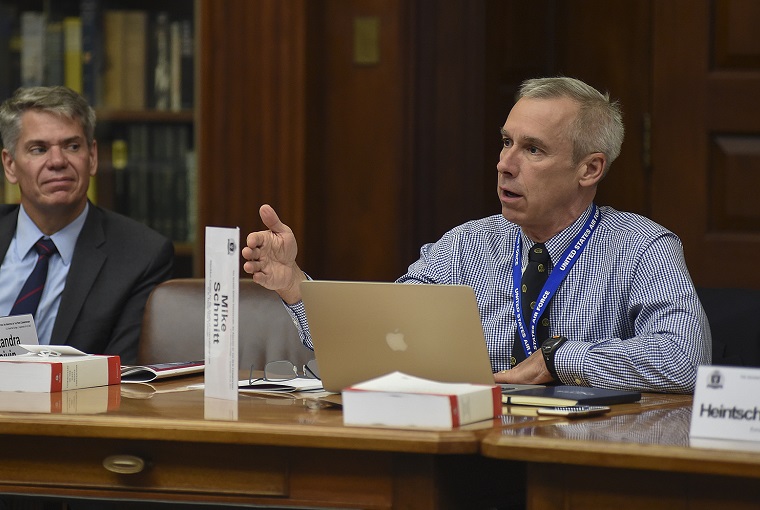Naval War College hosts Geneva Convention conference

NEWPORT, R.I. – The Second Geneva Convention, a new legal commentary, and how those documents relate to current international law were the focus of a legal conference at U.S. Naval War College (NWC) Newport, Rhode Island Sept. 14-15.
The conference, sponsored by NWC’s Stockton Center for the Study of International Law and the International Committee of the Red Cross (ICRC), focused on the ICRC’s updated commentary on the Second Geneva Convention, which was released earlier this year.
The ICRC is currently in the midst of providing updated commentaries to the four Geneva Conventions and Additional Protocols. The commentaries are vitally important to the process of interpreting the conventions, which are foundational documents in the laws of war.
“The purpose of this workshop is a deep-dive analysis on how the new commentaries may impact our understanding of international law going forward in relation to naval warfare,” said Air Force Lt. Col. Jeffrey Biller, military professor at the Stockton Center and organizer of the event. “The workshop format promotes a vigorous give and take amongst academics and practitioners to gain a more complete understanding of the convention in light of the new commentary.”
These ICRC commentaries are important to understanding the rules of conflict outlined in the conventions.
“The reason why the ICRC decided the time had come to update its commentaries was to make sure to have a new tool that would be relevant for the armed conflicts of the future, so that people would know how to interpret every single treaty provision,” said Bruno Demeyere, legal advisor with the ICRC who was part of the team writing updated ICRC commentaries.
Academics, legal practitioners, and military professionals attended the event.
According to Biller, the previous commentaries by ICRC were done in the years following World War II and a general consensus had been reached that they needed an update.
“It was time for a new set of commentaries to account for advancements in the law, technology and warfare. The last commentaries were done primarily in the 50s,” added Biller. “Any treaty is open to interpretation. And this will help make it (the Second Geneva Convention) more clear.”
Conference sessions included “Hospital Ships,” “Search for Wounded, Sick and Shipwrecked,” “Coastal Rescue Craft,” “Relationship between Second Geneva Convention and Other Related Treaties,” and others.
Demeyere added that NWC was the logical place to hold the conference.
“This is the ultimate center of expertise in North America in terms of people who are extremely knowledgeable about international law, law of armed conflict and law of naval warfare specifically,” said Demeyere.
Four treaties comprise the Geneva Conventions that established the standards of international law for humanitarian treatment in war.
The First Geneva Convention deals with land-based warfare, the Second Geneva Convention addresses issues at sea, the Third Geneva Convention deals with prisoners of war and the Fourth Geneva Convention addresses civilians during wartime. There are also Additional Protocols to the Geneva Convention dealing with the protection of civilian persons in time of war.
NWC is a one-year resident program that graduates about 600 resident students and about 1,000 distance learning students each year. Its primary mission is to educate and develop future leaders. Additional missions include: helping to define the future Navy and its roles and missions, supporting combat readiness, strengthening global maritime partnerships, promoting ethics and leadership throughout the force, contributing knowledge to shape effective decisions through our John B. Hattendorf Center for Maritime Historical Research, providing expertise and advice to the international legal community through the Stockton Center for the Study of International Law. Students earn Joint Professional Military Education (JPME) credit and either a diploma or a master’s degree in National Security and Strategic Studies or Defense and Strategic Studies. Established in 1884, U.S. Naval War College is the oldest institution of its kind in the world. More than 50,000 students have graduated since its first class of nine students in 1885 and about 300 of today’s active duty admirals, generals and senior executive service leaders are alumni.
